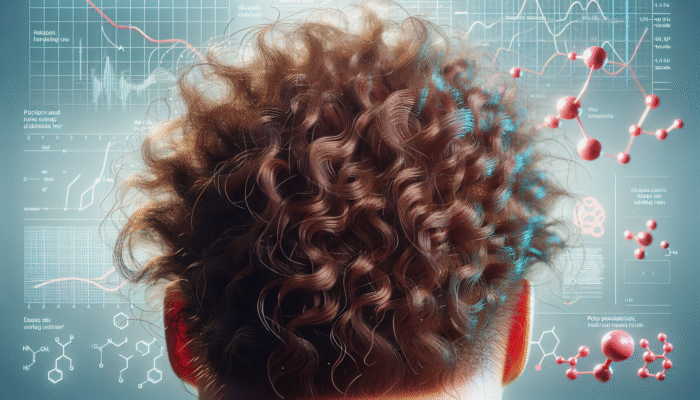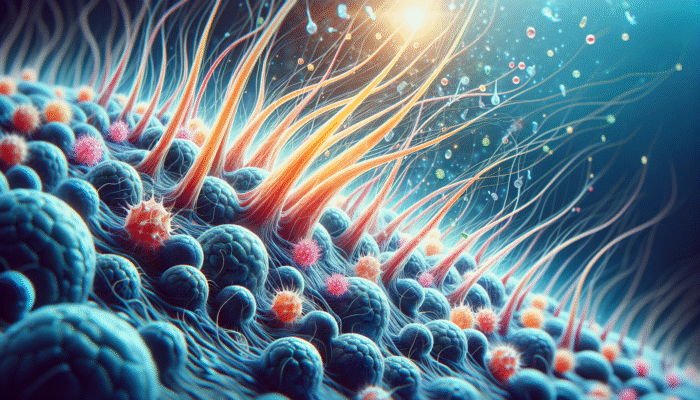Master the Art of Scalp Care to Unlock Maximum Hair Growth Potential
Dive Deep into the Vital Functions of Your Scalp and Its Influence on Hair Health

The scalp, often neglected in conversations surrounding hair growth, is, in fact, a cornerstone for achieving vibrant and healthy hair. Acting as a protective barrier, the scalp is responsible for supplying essential nutrients to hair follicles, thus creating an optimal environment conducive to hair flourishing. Neglect or damage to the scalp can result in significant issues such as hair thinning and loss. Notably, scientific studies, including those published in the *Journal of Dermatology*, illustrate a robust connection between scalp health and enhanced hair density. Individuals who maintain their scalps effectively tend to enjoy a richer hair volume compared to those suffering from scalp-related ailments. This compelling evidence highlights the critical importance of prioritising scalp care as an essential component of any successful hair growth regimen.
Additionally, various external factors such as climate, pollution, and exposure to harmful chemicals can profoundly affect scalp health, with these effects varying based on geographical conditions. For instance, urban dwellers frequently face heightened levels of air pollution, which can worsen scalp issues and impede hair growth. Gaining an understanding of this relationship empowers individuals to take proactive steps toward maintaining a healthy scalp, establishing a solid foundation for effective hair growth strategies that align with their unique circumstances.
Identifying and Addressing Common Scalp Conditions That Inhibit Hair Growth
Recognising common scalp conditions is essential for anyone serious about boosting hair growth. Conditions such as dandruff, <a href="https://amitys.co.uk/apple-cider-vinegar-for-scalp-health-a-comprehensive-guide/">psoriasis</a>, and dryness are widespread and can impact anyone, irrespective of their location. Dandruff, in particular, affects nearly half of the global population at some stage, causing discomfort, itchiness, and inflammation that can significantly hinder hair growth. Studies indicate that a flaky scalp disrupts the hair growth cycle, contributing to gradual hair thinning over time.
Psoriasis, classified as a chronic inflammatory disorder, can induce severe irritation and flaking on the scalp. This autoimmune condition often necessitates targeted treatments for effective symptom management. Individuals experiencing dryness may find their hair becomes brittle and susceptible to breakage, complicating their aspirations for hair growth. By addressing these prevalent scalp conditions through personalised care strategies, individuals can substantially enhance their chances of cultivating and sustaining healthy hair.
Implement Proven Scalp Hygiene Practices for Healthier Hair Growth
Regular scalp hygiene is imperative for anyone dedicated to achieving optimal hair health and growth. Just as our skin requires routine cleansing, the scalp must also remain clean and free from dirt, oil, and product accumulation. Neglecting scalp hygiene can lead to clogged hair follicles, which can severely obstruct hair growth. Establishing a cleansing routine that includes gentle shampoos and scalp exfoliators can create a nurturing environment for hair follicles to thrive.
Research consistently reveals that individuals who uphold excellent scalp hygiene experience enhanced hair growth and a reduction in instances of hair loss. For example, a study published in the *International Journal of Trichology* established a direct link between regular scalp cleansing and diminished hair shedding. This compelling evidence underscores the necessity of establishing a consistent scalp care routine tailored to individual hair and scalp types, ultimately ensuring optimal outcomes.
Comprehending the Fundamental Role of Proper Scalp Nutrition for Hair Growth

Nutrition plays an indispensable role in maintaining scalp health, which is essential for both hair strength and growth. A well-nourished scalp is equipped to support resilient hair follicles, thereby facilitating optimal hair growth. Critical nutrients such as vitamins A, C, D, E, along with minerals like zinc and iron, are vital for sustaining scalp vitality. Numerous studies indicate that deficiencies in these vital nutrients can detrimentally impact hair growth, leading to increased hair loss.
Integrating hydrating foods—such as avocados, nuts, and green leafy vegetables—into your diet can significantly enhance scalp health by providing essential hydration and nutrients. Omega-3 fatty acids, commonly found in fish and flaxseeds, also promote improved blood circulation to the scalp, further encouraging healthy hair growth. Consequently, prioritising a balanced diet rich in these vital nutrients is essential for anyone aiming to effectively advance their hair growth journey while promoting overall hair health.
Essential Nutritional Support to Stimulate Hair Growth
Key Nutrients Vital for Healthy Hair Growth
The journey toward achieving luxurious hair typically commences with a focus on nutrition, as specific vitamins and minerals are crucial for fostering hair growth. Key nutrients such as biotin, zinc, and iron are fundamental for maintaining strong and healthy hair. Biotin is frequently praised for its beneficial effects on hair, aiding in the production of keratin, the protein that forms the primary structure of hair. A deficiency in biotin can lead to hair thinning or loss, marking it as a crucial element for anyone aiming to maximise their hair growth potential.
Zinc is another essential mineral that significantly contributes to the health of hair follicles. It assists in the repair and proper functioning of hair tissue while also supporting the oil glands surrounding the hair follicles. Research published in the *Journal of Investigative Dermatology* found that individuals with low zinc levels experienced increased hair shedding. Similarly, iron plays a vital role in transporting oxygen within the bloodstream, ensuring that hair follicles receive the necessary oxygen and nutrients critical for growth.
Incorporating nutrient-rich foods such as eggs, nuts, seeds, and leafy greens into your diet can supply these essential nutrients, solidifying dietary choices as a foundational aspect of effective hair care and growth strategies.
The Strong Link Between Diet and Hair Health

The significant connection between diet and hair health cannot be overstated, with a balanced diet serving as the foundation for optimal hair growth. Consuming a diet rich in proteins and healthy fats is critical, as these macronutrients provide the essential building blocks for hair strands. Lean meats, fish, legumes, and dairy products are excellent sources of protein, while avocados and olive oil contribute healthy fats that effectively nourish the scalp.
A systematic review published in the *American Journal of Clinical Nutrition* highlighted the importance of protein intake for hair growth, revealing that individuals consuming sufficient amounts of protein experienced considerably less hair loss compared to their counterparts. Furthermore, maintaining stable blood sugar levels through a diet abundant in whole grains, fruits, and vegetables can help mitigate stress-related hair loss, given that fluctuations in blood sugar can adversely affect overall hair health and growth.
Incorporating a diverse array of nutrient-dense foods into one’s diet, focusing on both macronutrients and micronutrients, is essential for providing the crucial support needed to promote vibrant hair growth.
The Role of Supplements in Supporting Hair Growth
In certain instances, dietary choices alone may not sufficiently fulfil the nutritional requirements essential for optimal hair growth. This is where supplements come into play, providing a vital boost. Hair growth supplements containing biotin, collagen, and other necessary vitamins and minerals have gained popularity in recent years, often marketed as quick solutions for various hair concerns.
Research suggests that supplements can effectively bridge nutritional gaps, particularly for individuals with specific deficiencies. For instance, a study published in the *Journal of Cosmetic Dermatology* demonstrated that participants taking biotin supplements exhibited a marked increase in hair growth within just a few months. However, it is crucial to approach supplementation with caution, as excessive intake of certain vitamins can yield negative side effects.
It is advisable to consult a healthcare professional before embarking on any supplementation regimen, as they can provide tailored recommendations based on individual health profiles and specific hair growth objectives. In conclusion, carefully selected supplements can complement a healthy diet and significantly enhance overall hair growth outcomes.
Advanced Scalp Treatments for Optimal Hair Growth
The Revolutionary Impact of Microneedling on Scalp Health
Microneedling has emerged as a groundbreaking technique in the field of scalp care, yielding promising results for those looking to enhance hair growth. This innovative procedure utilises fine needles to create micro-injuries in the scalp, effectively stimulating the body’s natural healing processes. By boosting blood circulation and collagen production, microneedling can rejuvenate hair follicles, facilitating healthier hair growth.
Research conducted by dermatologists indicates that microneedling can significantly improve hair density in individuals suffering from androgenetic alopecia, a prevalent type of hair loss. A clinical trial published in the *Journal of Dermatology* found that participants receiving microneedling treatments experienced a substantial increase in hair count compared to those not undergoing this treatment.
Moreover, combining microneedling with topical treatments can enhance the effectiveness of various hair growth products, allowing for better absorption of beneficial ingredients into the scalp. As this method continues to gain popularity, more individuals are opting for microneedling as a promising option for advanced scalp care, eager to unlock its potential for encouraging vigorous hair growth.
The Benefits of Laser Therapy in Hair Restoration
Low-level laser therapy (LLLT) has gained recognition for its potential to stimulate hair growth and improve scalp health. This non-invasive treatment employs specific wavelengths of light to target hair follicles, promoting cellular activity and encouraging hair regrowth. Numerous studies have validated the effectiveness of LLLT in addressing hair loss in both men and women.
A systematic review published in the *American Journal of Clinical Dermatology* emphasised that participants undergoing regular laser therapy treatments observed significant improvements in hair density and thickness. This therapy is particularly appealing due to its non-invasive nature and minimal side effects, making it suitable for a wide range of individuals seeking effective solutions for hair growth.
Consistency is crucial for achieving optimal results with LLLT, as routine sessions can maximise efficacy. Many devices are now available for at-home use, enabling individuals to conveniently incorporate this advanced scalp treatment into their regular hair care regimens. As awareness of laser therapy expands, it is poised to become a staple in the toolkit for advanced scalp care and hair growth.
Uncovering the Benefits of Chemical Peels for Enhanced Scalp Health
Chemical peels, typically associated with facial rejuvenation, are increasingly being recognised for their potential benefits on scalp health. This advanced treatment involves applying a solution to the scalp that exfoliates dead skin cells and removes impurities, creating a cleaner environment for hair follicles. By eliminating debris and excess oil, chemical peels can help alleviate issues such as dandruff and scalp irritation, thereby fostering optimal conditions for hair growth.
Research suggests that chemical exfoliation can enhance scalp circulation and improve the overall health of hair follicles. A study published in the *Journal of Cosmetic Dermatology* demonstrated that individuals who underwent chemical peels on the scalp experienced significant reductions in flakiness and itchiness, leading to enhanced hair growth outcomes.
While chemical peels can be performed by dermatologists, at-home options are also available for those looking to elevate their scalp care routines. However, it is essential to proceed with caution and consult a professional to identify the most suitable treatment based on individual scalp types and conditions, ensuring both effectiveness and safety.
Maximising Scalp Massage Techniques to Boost Hair Growth
Uncover the Benefits of Scalp Massage for Enhanced Hair Growth
Scalp massage is a therapeutic practice that can significantly boost hair growth while simultaneously improving overall scalp health. The primary advantage of scalp massage lies in its ability to increase blood circulation to the scalp, thereby facilitating nutrient delivery to hair follicles. Enhanced circulation can also alleviate feelings of stress, often associated with hair loss, while creating an optimal environment for hair growth.
Research indicates that individuals who regularly practice scalp massage experience reduced tension and anxiety, positively influencing hair health. A study published in the *Journal of Clinical Psychology* revealed that participants who utilised relaxation techniques, including scalp massage, reported enhanced overall well-being and a decrease in hair loss.
Incorporating essential oils into scalp massage can further amplify its benefits. Oils like rosemary and peppermint have been shown to stimulate hair follicles and promote growth, making them excellent companions for a massage routine. By integrating scalp massages into hair care practices, individuals can enjoy a rejuvenating experience that not only promotes relaxation but also enhances hair growth simultaneously.
Implementing Effective Techniques for Maximum Scalp Massage Benefits
To optimise the benefits of scalp massage, it’s essential to employ effective techniques. A simple yet impactful method involves using your fingertips to apply gentle pressure in circular motions across the scalp. This technique encourages blood flow while providing a soothing experience. Concentrating on specific areas of tension can further enhance the benefits, ensuring that the scalp receives optimal care and attention.
For those looking to elevate their scalp massage experience, utilising tools such as massage brushes or jade rollers can offer additional advantages. These tools assist in stimulating the scalp more effectively, thereby enhancing circulation and promoting relaxation.
The frequency and duration of scalp massages are also crucial in achieving the best results. Ideally, engaging in scalp massage a few times a week, with each session lasting 10 to 15 minutes, can noticeably improve scalp health and support hair growth. By establishing a consistent routine, individuals can create a nurturing environment for their hair to thrive.
Establishing the Right Frequency and Duration for Scalp Massages
Consistency is paramount when it comes to scalp massage and its benefits for hair growth. Regular massages not only stimulate blood circulation but also help alleviate tension and encourage relaxation. Ideally, dedicating time for scalp massage two to three times a week can yield significant results over time.
The duration of each massage session is equally important. Experts recommend spending at least 10 to 15 minutes per session, allowing ample time for the scalp to absorb the benefits of increased circulation. This time can be divided among specific areas, dedicating a few minutes to each section of the scalp to ensure comprehensive coverage and care.
Incorporating scalp massage into daily practices, whether during hair washing or as an independent activity, can enhance the overall experience. By prioritising consistent and mindful scalp massages, individuals can unlock the potential for improved hair health and growth, ultimately leading to better outcomes.
Selecting the Best Products for Optimising Scalp Health
Identifying Key Ingredients That Promote Healthy Hair Growth
When it comes to choosing hair care products that support advanced scalp care for hair growth, understanding which ingredients to prioritise is vital. Products infused with active components such as caffeine, minoxidil, and keratin can significantly promote healthy hair growth. Caffeine, for instance, has been shown to stimulate hair follicles, encouraging growth while reducing hair loss, making it a valuable addition to shampoos and treatments.
Minoxidil, widely recognised for its effectiveness in treating hair loss, has been scientifically proven to stimulate hair regrowth in both men and women. Incorporating products containing minoxidil into one’s routine can form a solid foundation for effective hair growth efforts. Keratin, the protein that comprises the structure of hair, aids in strengthening and protecting hair strands from damage, further enhancing hair health.
Additionally, botanical ingredients like tea tree oil and aloe vera offer soothing properties that can improve scalp conditions, thus creating an optimal environment for hair growth. By prioritising products formulated with these beneficial ingredients, individuals can take proactive steps toward achieving their hair growth aspirations.
Avoiding Ingredients That Can Impede Hair Growth
While selecting hair care products, it is equally important to be vigilant about harmful substances that may hinder hair growth and damage the scalp. Ingredients such as sulfates, parabens, and silicones should be avoided. Sulfates can strip the scalp of its natural oils, leading to dryness and irritation, while parabens have been linked to hormone disruption, potentially affecting hair growth.
Silicones, while providing temporary shine and smoothness, can create buildup on the scalp, resulting in clogged hair follicles and obstructed hair growth. Research indicates that consistent use of products containing these harmful ingredients can exacerbate scalp issues, ultimately detracting from hair health.
Opting for natural or organic hair care products can help mitigate these risks, allowing individuals to maintain a healthy scalp environment conducive to effective hair growth. By being discerning about the ingredients in hair products, consumers can make informed choices that support their hair health journey.
Customising Products to Suit Your Unique Scalp Type
Understanding your scalp type is crucial for selecting the most effective products for promoting hair growth. Scalp types can vary significantly—from oily to dry or sensitive—and each requires a tailored approach to care. For instance, individuals with oily scalps may benefit from lightweight, clarifying shampoos designed to eliminate excess oil without stripping the scalp's moisture.
Conversely, those with dry or sensitive scalps should opt for hydrating shampoos and nourishing conditioners containing soothing ingredients like chamomile or calendula. Recognising individual scalp needs allows for a more targeted approach, maximising the benefits of various hair care products tailored to specific requirements.
Additionally, experimenting with different formulations can yield insights into what works best for personal hair and scalp health. Understanding these nuances empowers individuals to curate a personalised hair care regimen that effectively supports and enhances advanced scalp care for hair growth.
Evaluating Product Formulations for Optimal Effectiveness
Choosing the right formulations is pivotal for optimising scalp health and promoting hair growth. Various product forms, including shampoos, conditioners, serums, and oils, can cater to specific scalp needs. For instance, shampoos formulated with active growth-enhancing ingredients can lay a solid foundation for scalp health, while conditioners provide essential hydration and nourishment required for healthy hair.
Serums and oils can be particularly advantageous for addressing specific scalp concerns, delivering concentrated doses of active ingredients directly to the hair follicles. These formulations can assist in treating issues like dryness or irritation, further supporting optimal conditions for hair growth.
When selecting products, it is essential to consider your entire hair care routine. Harmonising different types of products—such as pairing a nourishing shampoo with a complementary conditioner—can provide cohesive support for both the scalp and hair. By assessing product formulations holistically, individuals can enhance their overall hair care experience, leading to improved hair growth outcomes.
Assessing Product Effectiveness Through Research and User Reviews
Before committing to hair care products, it is crucial to evaluate their effectiveness through thorough research and user reviews. Clinical studies and trials offer insights into the efficacy of specific ingredients and formulations, equipping consumers with valuable data. For instance, peer-reviewed studies documenting the results of particular hair growth treatments can guide individuals in making informed decisions.
Additionally, customer reviews provide real-world perspectives on product performance. Engaging with online communities and forums focused on hair health can yield insights into which products deliver the desired results effectively. By gathering this information, individuals can feel more confident in their purchasing decisions, ensuring they select products that align with their hair growth objectives.
Understanding Lifestyle Factors That Influence Hair Growth
Strategies to Manage Stress for Enhanced Hair Growth
The connection between stress and hair loss is becoming increasingly acknowledged, making effective stress management a crucial component in fostering advanced scalp care for hair growth. Elevated stress levels can trigger hair loss conditions such as telogen effluvium, wherein hair follicles enter a resting phase and shed more readily. Therefore, implementing stress-reduction techniques can serve as a powerful tool for individuals seeking to maintain healthy hair.
Practices such as mindfulness meditation, yoga, and regular exercise can significantly lower stress levels, positively impacting both overall well-being and hair health. Research indicates that individuals who partake in stress-reducing activities experience improved hair growth and heightened resilience against hair loss. Incorporating these techniques into daily routines can help cultivate a more balanced lifestyle, ultimately supporting hair growth goals.
The Significance of Quality Sleep for Promoting Hair Growth
Adequate sleep is essential for holistic health, including hair growth. During sleep, the body undergoes critical repair processes, allowing for the rejuvenation of hair follicles and enhancement of scalp health. Studies show that individuals who consistently prioritise quality sleep achieve superior hair growth outcomes compared to those who do not.
Sleep deprivation can elevate levels of stress hormones, negatively affecting hair health. Furthermore, insufficient sleep disrupts the body’s natural cycles, inhibiting the growth phase of hair. By establishing a consistent sleep routine and creating a conducive sleep environment, individuals can significantly boost their hair growth potential, ensuring their bodies have ample time to repair and regenerate.
The Detrimental Impact of Smoking on Hair Growth
The harmful effects of smoking on overall health are well-documented, and its influence on hair growth is no exception. Smoking impairs blood circulation, reducing the flow of vital nutrients and oxygen to the scalp and hair follicles. This compromised circulation can lead to diminished hair growth and an increased risk of hair loss over time.
Research has established a direct correlation between smoking and hair thinning, particularly in men. Given that smoking contributes to various health issues, including cardiovascular diseases, it is crucial for individuals aiming to improve their hair health to consider quitting or reducing their tobacco use. By prioritising a smoke-free lifestyle, individuals can enhance their overall health while fostering a more favourable environment for hair growth.
The Influence of Diet and Nutrition on Hair Growth
As previously highlighted, diet and nutrition play a vital role in supporting hair growth. A balanced diet rich in essential vitamins and minerals is crucial for maintaining a healthy scalp and promoting hair vitality. Deficiencies in key nutrients, such as iron and zinc, can lead to hair thinning and loss, underscoring the significance of focusing on nutrient-dense foods.
Incorporating a broad array of whole foods—including fruits, vegetables, whole grains, lean proteins, and healthy fats—can provide the necessary nutrients for robust hair growth. Research consistently demonstrates that individuals who maintain a balanced diet experience improved hair health and fewer instances of hair loss. By prioritising dietary choices, individuals can significantly influence their hair growth journey, ensuring they equip their bodies with optimal support for healthy hair.
Monitoring and Adjusting Your Hair Care Routine for Optimal Results
Effectively Tracking Your Hair Growth Progress
Monitoring hair growth progress is essential for effective hair care, allowing individuals to adjust their routines for optimal outcomes. Regularly assessing hair density, thickness, and overall health provides valuable insights into which strategies are effective and which may need adjustment.
Keeping a journal to document changes in hair growth, along with notes on product usage and dietary habits, can aid in identifying patterns and trends. This approach empowers individuals to make informed decisions regarding their hair care regimen, ultimately enhancing their ability to achieve desired hair growth results.
Additionally, seeking professional guidance from dermatologists or trichologists can enrich this process. These experts can offer personalised assessments and recommendations based on individual conditions and goals, ensuring that each person receives tailored care suited to their unique needs and aspirations.
Frequently Asked Questions About Scalp Care and Hair Growth
What is advanced scalp care for hair growth?
Advanced scalp care for hair growth encompasses specialised treatments and routines designed to optimise scalp health, thereby promoting healthy and vigorous hair growth. This includes techniques such as microneedling, laser therapy, and appropriate nutritional practices.
How often should I perform scalp massages for optimal hair growth?
For the best results, it is recommended to massage your scalp two to three times a week for approximately 10 to 15 minutes per session. Regular massages enhance blood circulation and promote overall hair health.
Which nutrients are vital for hair growth?
Key nutrients for hair growth encompass biotin, zinc, iron, and proteins. These vitamins and minerals support the health of hair follicles and enhance overall hair strength and vitality.
Can my diet impact my scalp health?
Yes, a balanced diet rich in vitamins, minerals, and healthy fats is crucial for maintaining scalp health. Deficiencies in essential nutrients can lead to hair thinning and loss, emphasising the importance of a nutritious diet.
Is microneedling effective for promoting hair growth?
Microneedling is an effective technique for stimulating hair growth, as it enhances blood flow and collagen production, thereby establishing a healthier environment for hair follicles to thrive.
Are there harmful ingredients I should avoid in hair care products?
Yes, it is advisable to avoid products containing sulfates, parabens, and silicones, as these can irritate the scalp and hinder hair growth.
How does stress affect hair growth?
Elevated stress levels can lead to hair loss conditions like telogen effluvium, where hair follicles enter a resting phase, resulting in increased shedding and thinning.
What role does sleep play in hair health?
Adequate sleep is essential for hair health, as it allows the body to repair and regenerate hair follicles, thus promoting optimal hair growth.
Can supplements assist in promoting hair growth?
Yes, supplements containing essential vitamins and minerals can bridge nutritional gaps and enhance hair growth, especially if dietary intake is insufficient for optimal health.
How can I effectively track my hair growth progress?
Maintaining a hair journal to monitor changes in density, thickness, and overall health can be effective. Documenting product usage and dietary habits can assist in identifying effective strategies and areas that may require improvement.
Connect with us on Facebook!
The Article: Advanced Scalp Care for Hair Growth: Essential Techniques appeared first on Amitys Hair Salon.
The Article Scalp Care Techniques for Enhanced Hair Growth Was Found On https://limitsofstrategy.com

